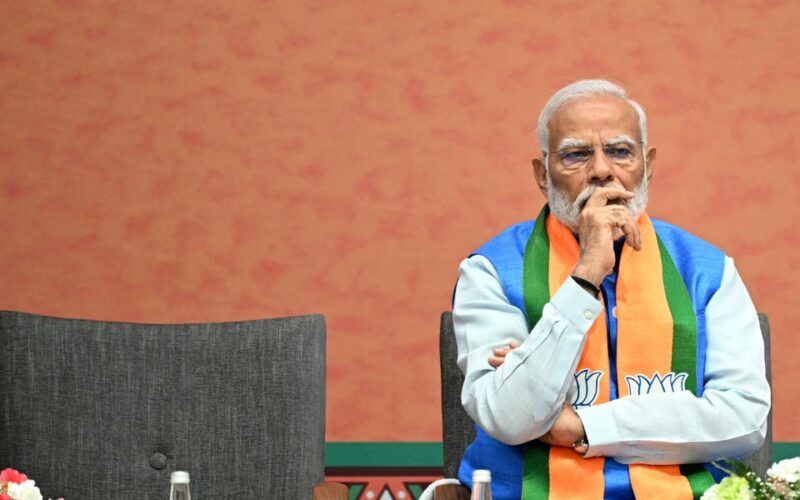Narendra Modi has been prime minister of India for 10 years.
On Tuesday, he extended his tenure by another potential five years when his ruling party, the Bharatiya Janata Party, secured a majority in the lower house of parliament with its allies.
That’s the key to everything being said about the world’s biggest election — without his allies, Modi would have lost control of parliament and, by extension, India.
It’s why the election results have been a shocking blow to Modi and the BJP despite them winning.
Anyone seeking a majority in India’s parliament — the prerequisite for naming a prime minister — needed to win 272 out of 543 seats. And this time, the BJP won only 240, relying on smaller parties under a coalition called the National Democratic Alliance to carry it past the finish line.
For a BJP that previously enjoyed a majority on its own with 303 seats in 2019, that’s a stark shift in its grip on power. Its alliance only managed to secure 293 seats, just 21 more than needed for a majority.
The result was especially humbling for Modi because the NDA was projected to slam-dunk the election with a whopping 400 seats. The incumbent seemed so confident that he declared victory three days before the result announcements, saying his voters turned out in “record numbers.”
Now, though, his allies hold the enviable position of being the difference-maker in deciding who leads India. Should they all ditch Modi for his rivals in the Indian National Developmental Inclusive Alliance, they could oust him from leadership.
Two of the biggest players in that gaggle of kingmakers, the Telugu Desam Party and the Janata Dal (United), hold a combined 28 seats and are led by politicians known for switching loyalties, per Bloomberg.
Modi now must ensure his coalition holds so he can remain in office, and is set to enter talks with allied leaders to secure their support.
His weakened hold on India’s parliament was big news to observers concerned about the rise of his ideology, Hindutva, which promotes building a Hindu nation and has been criticized as right-wing and anti-Muslim extremism.
So why did the stock market tumble?
Tuesday’s result surprised a world expecting Modi to trounce his opponents and widen his lead in parliament.
India’s stock market posted its worst day in four years after the announcement, dropping by as much as 8.5% on Tuesday before ending the day at 5.9%.
Why the loss of faith? Experts aren’t expecting monumental change for India’s economy, but a coalition government will likely be far less nimble with major policies.
“India’s economic and security drivers will remain unchanged. However, a coalition government will often take big decisions more slowly and be less inclined to push states to meet national objectives in areas like the energy transition,” wrote Richard Rossow, chair of US-India Policy Studies at the Center for Strategic & International Studies.
And with uncertainty hanging over the BJP’s hold on power, questions are growing about what India’s policies might soon look like.
Experts like Jeff Lande, a nonresident fellow at the Atlantic Council’s South Asia Center, think it’s highly unlikely we’ll see any reversal in the overall direction of India’s economy.
Modi’s heavy investment style and capital expenditure should still continue, Lande wrote.
“Policy and political decisions will likely be delayed,” he added. “Industry, particularly multinational corporations, and partner governments may hold off on some decisions as they wait and see how the new government develops.”
This year’s shock result also casts doubt on whether Modi can decisively coalesce enough momentum to rocket the Indian economy forward and allow it to one day catch up with China’s.
The country has lagged behind Beijing’s rapid growth since the 1980s, and Modi wants to lay the groundwork for India to become a global manufacturing hub in the next few years.
But Kapil Sharma, acting senior director of the Atlantic Council’s South Asia Center, said the BJP slipping is good for India’s economy as a whole.
The votes show that the average Indian citizen isn’t feeling the economic benefits that Modi’s policies have brought to the wider nation, and the ruling party will have to govern with extra care to maintain its lead, Sharma wrote.
“The BJP and its coalition government are now operating in a ‘now or never’ moment,” he wrote.
As for foreign policy, most experts say Modi’s allies are unlikely to fundamentally alter India’s approach.
Rossow of CSIS said Chinese aggression should continue pushing India to work closely with the US.
“The United States’ willingness to share advanced weapons systems, contribute to India’s domestic defense manufacturing, and offer assistance during periods of military tension with China provides a strong foundation that should withstand political change,” he said.
Most experts say the election results show that the world’s largest nation still holds onto its democracy.
Gautam Nair, an assistant professor of public policy at Harvard, called Tuesday a “watershed moment” that showed Modi’s nationalist message wasn’t resonating with voters.
Rossow said that despite Modi extending his influence over key institutions such as the courts, voters are still making their choices count. “This election, even if Prime Minister Modi retains power, shows the power of India’s democracy,” said Rossow.
Source link
lol

